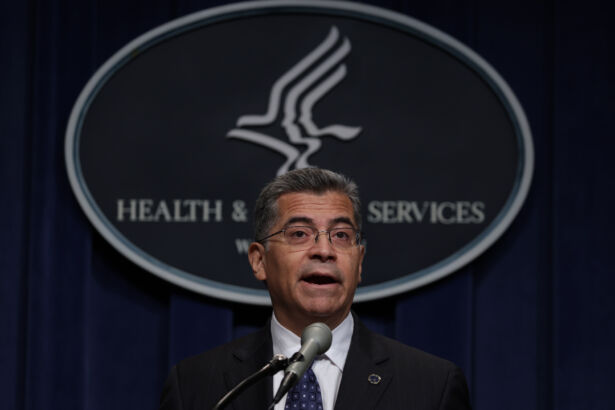The federal Centers for Medicare and Medicaid Services (CMS) on Tuesday released a list of 10 drugs that will be part of the Medicare price-setting Drug Price Negotiation Program that was established via the Inflation Reduction Act.
The selected drug list for the first round, according to CMS, includes Eliquis, Jardiance, Xarelto, Januvia, Enbrel, Farxiga, Entresto, Imbruvica, and Stelara, as well as multiple types of Novo Nordisk’s Fiasp. They include Fiasp FlexTouch, Fiasp PenFill, NovoLog, NovoLog FlexPen, and NovoLog PenFill.
Eliquis, made by Bristol-Myers Squibb and Pfizer, is for treating blood clots; Jardiance, made by Boehringer Ingelheim and Eli Lilly and Co., is meant to treat diabetes and heart failure; Xarelto, made by Janssen Pharmaceuticals, is meant for prevention and treatment of blood clots; Januvia, made by Merck, is for treating diabetes; Farxiga, made by AstraZeneca and Bristol-Myers Squibb, is intended to treat diabetes, chronic kidney disease, and heart failure; and Entresto, made by Novartis, is for treating heart failure.
Meanwhile, Enbrel, made by Immunex Corporation, is for treating rheumatoid arthritis, psoriasis, and psoriatic arthritis; Imbruvica, made by Pharmacyclics and Janssen Biotech, is for treating blood cancers; Stelara, made by Janssen Biotech, is for treating psoriasis, psoriatic arthritis, Crohn’s disease, and ulcerative colitis; and NovoLog, made by Novo Nordisk, is for treating diabetes.
Democrats, President Joe Biden, and Biden administration officials were quick to tout the drug price plan, claiming they “took on Big Pharma” to negotiate the deal, while accusing pharmaceutical companies of making “record profits while American families were saddled with record prices and unable to afford life-saving prescription drugs.” They also touted the Inflation Reduction Act, a $740 billion measure that was signed into law by President Biden in mid-2022.
Drug companies that refuse to be a part of the new negotiation process will be heavily taxed. Already, the plan faces several lawsuits, including complaints filed by drugmakers Merck and Bristol-Myers Squibb and a key lobbying group, the Pharmaceutical Research and Manufacturers of America (PhRMA).
The 10 drugs accounted for $50.5 billion in Medicare Part D spending from June 2022 to May 2023, or around 20 percent of the Part D prescription drug costs, said the Department of Health and Human Services (HHS) in a news release. More than 52 million people who either are 65 or older or have certain severe disabilities or illnesses get prescription drug coverage through Medicare’s Part D program, according to CMS.
HHS “will publish any agreed-upon negotiated prices for the selected drugs by September 1, 2024; those prices will come into effect starting January 1, 2026,” said HHS. “In future years, CMS will select for negotiation up to 15 more drugs covered under Part D for 2027, up to 15 more drugs for 2028 (including drugs covered under Part B and Part D), and up to 20 more drugs for each year after that, as outlined in the Inflation Reduction Act.”
Medicare spent about $10 billion in 2020 on Eliquis, according to AARP research. The drug from Pfizer and Bristol-Myers Squibb treats blood clots in the legs and lungs and reduces the risk of stroke in people with an irregular heartbeat called atrial fibrillation.
Senior administration officials, who were named, told news outlets Tuesday that the 10 drugs selected for negotiation are among the most costly to the Medicare program. They said 8.2 million people with Medicare Part D prescription drug coverage take them.

The Inflation Reduction Act already caps Medicare patient out-of-pocket costs for insulin at $35 a month. An administration official told The Associated Press on Tuesday that upper limit will hold but there could be further changes in those costs.
About 9 percent of Medicare beneficiaries age 65 and older said in 2021 that they did not fill a prescription or skipped a drug dose due to cost, according to research by the Commonwealth Fund, which studies health care issues.
Opposition
PhRMA, or the Pharmaceutical Research and Manufacturers of America, said earlier this year in a federal court complaint targeting the Biden administration’s drug-negotiation plan. In a release, the group said the federal government is essentially attempting to “force manufacturers to agree to the government-dictated price” under the Inflation Reduction Act by imposing “an escalating ‘excise tax’ that begins at 186 percent of a medicine’s total sales revenue and reaches a maximum of 1900 percent.”
“The only other option manufacturers have if they do not agree to the government’s price is to pull all of their medicines from Medicare and Medicaid—not just the medicine subject to price setting,” it said (pdf). “It would take manufacturers a year or more to end their agreement with CMS and would require them to withdraw from Medicare and Medicaid entirely.”
Further, the group argued that the plan is unconstitutional because it violates the Constitution’s Separation of Powers clause. Meanwhile, it also levies “excessive fines” on non-compliant companies, which the organization says violates the Constitution’s Eighth Amendment that bars excessive fines and penalties.
“Congress has impermissibly delegated broad authority to HHS to set prices within Medicare with no meaningful constraints on the agency’s exercise of this new price-setting authority. This is in conflict with fundamental separation-of-powers and nondelegation principles in the Constitution,” its statement said.
The Associated Press contributed to this report.
From The Epoch Times
